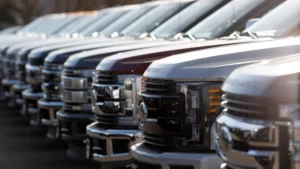Renting Vs Buying: What Makes Sense for Your Business
Authored by Shaefer Schuetz
Why would anyone want to rent anything? Equity is sexy. Something feels good about saying, “Yeah, that’s mine. I own that.”
The reality is that in many cases, buying commercial vehicles makes sense. However, in some cases, renting or leasing business vehicles makes more sense.
The fun part is getting to decide which works best for your organization.
In many instances, financial executives handle the numbers, without consulting anyone else in the organization. Wouldn’t it feel good to take your seat at the table and offer some valuable input to the CFO yourself about truck leasing and van rental options?
The first step in figuring out if renting or buying makes more sense for your business is to educate yourself. Let’s walk through the financial benefits of renting compared to buying so you can be an impactful part of the business conversation.
Want to learn more? Download our FREE renting vs. buying brochure
FINANCIAL CONSIDERATIONS OF RENTING VS. BUYING
Time value of money
The underlying foundation for every financial institution in the world is a concept that is foreign to many: Time value of money. The principles of this idea can be found in essentially every financial function imaginable. Time value of money is the idea that money today is worth more than an identical sum of money at any future date. The reason for this is earning potential. Because of interest, inflation, potential growth rates, capital gains, etc., $1 today is worth more than $1 tomorrow.
Your money should work for you. Financers know this—and this is why money in your pocket today is as valuable as it will ever be.
Cash allocation
When you exclusively purchase the vehicles in your commercial fleet, you tie up a lot of money in an asset that you know will depreciate extensively.
Wouldn’t you want to allocate your cash in a way that generates revenue? Cash allocation for revenue generation should be the main focus for any business operating with a profit margin in mind.
So why would anyone want to throw loads of cash into a depreciating money pit like commercial vehicles? This exact question is why City Rent A Truck exists.

Return on assets
When an organization purchases its own vehicles, equipment is charted in the asset column. This is an asset that does not always directly pull its own weight. Because these vehicles are not necessarily income-producing assets, your return on assets (ROA) will fall. This will be even more prevalent with the record high sale prices we are seeing in the automotive industry.
With truck rental, you won’t have to worry about an incredibly high purchase price with no direct income dragging down your ROA.
Interest Rates
With inflation at a 40 year high, a large spike in interest rates by the Fed is expected in 2022.
If you finance your entire fleet through debt, you may want to consider ditching the interest payments and opening up some of that credit allowance for assets that will either produce income or appreciate in value—not ones that depreciate throughout their lifetime like when you buy commercial vehicles.

Record High Vehicle Prices
There is a monumental shortage of new and used vehicles right now, caused in large part by the global shortage of semiconductor chips.
This has not only resulted in substantially higher prices, it has also made vehicles very difficult to find.
Renting becomes a far more viable option as shortages linger on. Keep your cash close to your chest. Let us worry about finding and financing the depreciating assets.
Want to learn more? Download our FREE renting vs. buying brochure
The Bottom Line
Publicly held companies are often reminded of all these financial ratios and factors by current and potential investors. Unfortunately, many privately held companies are not generally concerned with them.
Well, I can assure you the way in which you leverage your business will be analyzed and contemplated, by any creditor considering a business relationship. This will be the case whether you are public or private.
The age-old question of, “Should I buy or rent?” is alive and well. With an answer fit for some guy that works at a truck rental company: rent. Always rent. For the love of God, just rent.




